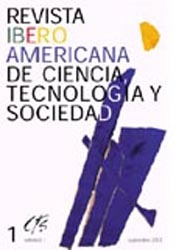Methodological Proposal for Measuring the Knowledge Society in Latin American Countries
DOI:
https://doi.org/10.52712/issn.1850-0013-1091Keywords:
knowledge society, indicators, knowledge economyAbstract
This article exposes a methodological proposal aiming to guide the activities for the measurement of the different aspects composing Knowledge Society in Latin America. The goal is that the constructed indicators have the capability to properly reflect the evolution and specific characteristics of the processes of development and spreading of Knowledge Society in Latin America and be, as well, capable of being internationally compared. The proposal has two parts. The first one exposes a general conceptual framework for the measurement of Knowledge Society, which is an attempt of making an integral approach to the analysis of these processes, aiming that their adoption -as a common basis to unify criteria, coordinate actions and efforts- could make easier the execution of joint and complementary works by different groups, teams and persons. The second one, is an attempt of making a contribution on how to approach to the performance of economic agents in this new paradigm, characterized by a deep change at the generation, management and circulation of information and knowledge.
Downloads
References
BELL, D. (1976): El advenimiento de la sociedad post-industrial, Madrid, Alianza Editorial.
BIANCO, C.; LUGONES, G.; PEIRANO, F. y SALAZAR, M. (2002): “Indicadores de la Sociedad del Conocimiento: aspectos conceptuales y metodológicos”, COLCIENCIAS/OCT/OEA, mimeo.
CHAPARRO, F. (1998): Conocimiento, Innovación y Construcción de Sociedad: Una Agenda para la Colombia del Siglo XXI, Bogotá, COLCIENCIAS y Tercer Mundo Editores.
DAVID, P. y FORAY, D. (2002): “Una introducción a la economía y a la sociedad del saber” en Revista Internacional de Ciencias Sociales, N° 171, UNESCO, Marzo, www.unesco.org/issj
HANSSON, S. (2002): “Las inseguridades de la sociedad del conocimiento”, en Revista Internacional de Ciencias Sociales, N° 171, UNESCO, Marzo, www.unesco.org/issj
HOWITT, P. (1996): “On some problems in measuring knowledge-based growth” in Peters Howitt (ed), The Implication of Knowledge-based Growth for Micro-Economic Policies, The University of Calgary Press.
JARAMILLO, H. y FORERO, C. (2001): “La interacción entre el capital humano, el capital intelectual y el capital social: Una aproximación a la medición de recursos humanos en ciencia y tecnología”, documento presentado en el V Taller Iberoamericano e Interamericano de Indicadores de Ciencia y Tecnología, RICYT, Montevideo, Octubre.
JARAMILLO, H.; LUGONES, G. y SALAZAR, M. (2000):Normalización de Indicadores de Innovación Tecnológica para América Latina y el Caribe. Manual de Bogotá, Bogotá, OEA, COLCIENCIAS, RICYT y OCyT, www.ricyt.edu.ar
KARLSSON, CH. y MANDUCHI, A. (2001): “Knowledge spillovers in a spatial context - A critical review and assessment” in Manfred Fischer and Joseph Frolich (eds), Knowledge, Complexity and Innovation Systems, Springer.
LALL, S. (1992): “Technological capabilities and industrialization”, World Development, Vol. 20, No. 2
MANSELL, R. y WEHN, U. (1998): Knowledge Societies: Information Technology for Sustainable Development, Oxford University Press.
OCDE (2000): Measuring the ICT sector, París, Organisation for Economic Co-operation and Development, Octubre.
OCDE (1997): Proposed Guidelines for Collecting and Interpreting Technological Innovation Data. Oslo Manual. 2° Edición, Paris, Organisation for Economic Co-operation and Development.
OCDE (1996): The Knowledge-based Economy, París, Organisation for Economic Co-operation and Development.
SMITH, K. (2000): “What is the ´knowledge economy´? Knowledge-intensive industries and distributed knowledge bases” ponencia presentada en DRUID Summer Conference on The Learning Economy - Firms, Regions and Nation Specific Institutions, Aalborg, Dinamarca, 15 al 17 de Junio.
UNIÓN EUROPEA (1996): Green Paper: Living and working in the Information Society: People First Commision of the European Communities, Bruselas.
VALENTI, P. (2002): “La Sociedad de la Información en América Latina y el Caribe: TICs y un nuevo marco Institucional”, Revista CTS+I, OEI, No. 2, Enero - Abril.
Downloads
Published
How to Cite
Issue
Section
License
Copyright (c) 2025 CC Attribution 4.0

This work is licensed under a Creative Commons Attribution 4.0 International License.
All CTS's issues and academic articles are under a CC-BY license.
Since 2007, CTS has provided open and free access to all its contents, including the complete archive of its quarterly edition and the different products presented in its electronic platform. This decision is based on the belief that offering free access to published materials helps to build a greater and better exchange of knowledge.
In turn, for the quarterly edition, CTS allows institutional and thematic repositories, as well as personal web pages, to self-archive articles in their post-print or editorial version, immediately after the publication of the final version of each issue and under the condition that a link to the original source will be incorporated into the self-archive.











